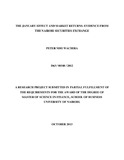| dc.description.abstract | The January effect is attributed to a general increase in stock prices in January. It is a
phenomenon that has been observed since 1925, and researchers have found that the anomaly has
existed for more than half a century (Cataldo and Savage, 2000). This anomaly has attracted
tremendous interest among researchers because it is difficult to reconcile with the efficient
market hypothesis (EMH). Previous works on the January effect, especially those of an empirical
nature, have found this anomaly to exist in many stock markets all over the world. The objective
of this study was to find out whether there exists a January effect at the Nairobi Securities
Exchange. The population of interest was all the listed companies for equity stocks at the NSE as
at December 2012. The data comprised of daily values of the two major indices; Nairobi
Securities Exchange 20-share index and Nairobi Securities Exchange All-share index.
Regression analysis was used to analyze the data collected. The results show negative
coefficients in the model used. These coefficients confirm existence of January effect since they
signify higher returns in January than other months. T-statistics analysis indicated that the
coefficients are significant confirming that January effect does not exist at NSE. Further study
should be undertaken to explain why January effect exists in this market | en |

